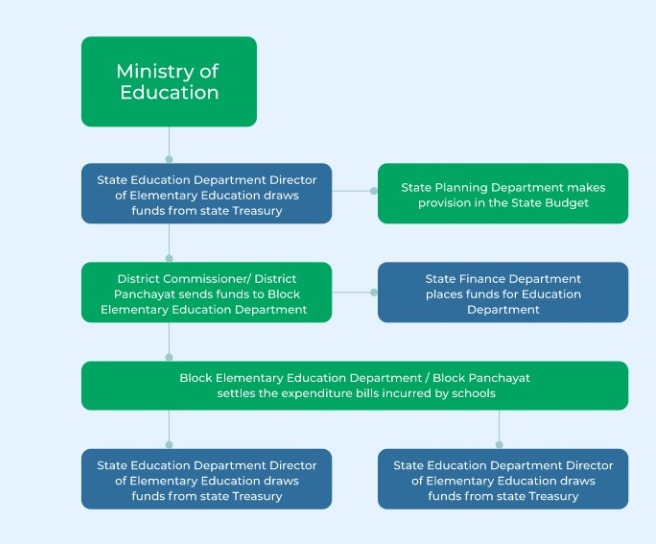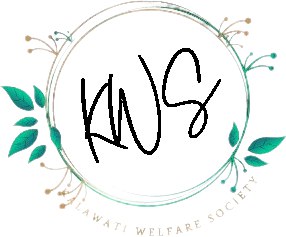Flow of Funds from Ministry of Education to KWS NGO
1. Proposal Submission
- KWS NGO submits a detailed project proposal to the Ministry of Education, including objectives, implementation plan, target outcomes, and a budget breakdown.
- The proposal is reviewed by the concerned department within the Ministry of Education to ensure alignment with the ministry’s objectives and guidelines.
2. Approval Process
- The Ministry evaluates the proposal based on set criteria, including the NGO's credibility, past work, and the relevance of the proposed project.
- Once approved, a formal sanction letter is issued to KWS, outlining the terms and conditions for the release of funds.
3. Signing of MoU
- A Memorandum of Understanding (MoU) is signed between the Ministry of Education and KWS NGO.
- The MoU includes details about fund utilization, reporting requirements, and compliance with regulations.


5. Implementation and Monitoring
- KWS implements the project as per the approved plan.
- Regular updates and progress reports are submitted to the Ministry to ensure proper utilization of funds.
- The Ministry may conduct audits or field inspections to monitor the progress.
6. Release of Subsequent Installments
- Upon successful verification of the project’s progress and utilization of the first installment, subsequent funds are released in phases.
- Each release is contingent on compliance with reporting and auditing requirements.
7. Project Completion and Final Report
- After project completion, KWS submits a comprehensive final report to the Ministry, including financial statements, project outcomes, and impact analysis.
- The Ministry may conduct a final audit to ensure that the funds were utilized as intended.
8. Closure of Funds
- Post-audit and approval of the final report, the Ministry issues a closure certificate to KWS NGO, formally completing the funding process.
Flow of Funds from CSR Initiatives to KWS NGO
1. Identification of CSR Opportunity
- KWS NGO identifies companies with CSR obligations under Section 135 of the Companies Act, 2013, focusing on those whose CSR priorities align with the NGO’s objectives.
- A detailed project proposal is prepared, outlining the initiative, target beneficiaries, budget, timeline, and expected impact.
2. Proposal Submission
- KWS submits the proposal to the company’s CSR committee or designated team.
- The company evaluates the proposal to ensure alignment with its CSR policy and compliance with government guidelines.
3. Approval Process
- The CSR committee conducts due diligence on KWS NGO, including legal status, financial health, past projects, and organizational credibility.
- Once approved, a formal agreement or Memorandum of Understanding (MoU) is signed between the company and KWS.
4. Fund Disbursement
- Initial Disbursement: The company releases the first installment of funds based on the approved project budget and deliverables.
- The funds are transferred electronically to the NGO’s designated bank account, ensuring transparency.
- The terms of fund usage are clearly mentioned in the agreement, including restrictions on overhead expenses and administrative costs.


5. Implementation and Reporting
- KWS initiates the project as per the plan and regularly reports on progress to the company.
- Reports typically include milestones achieved, challenges faced, and utilization of funds.
- Site visits or third-party audits may be conducted by the company to verify the project’s progress and impact.
6. Release of Subsequent Installments
- Based on successful progress reports and audits, the company releases the remaining funds in installments.
- Each tranche is contingent on compliance with agreed-upon timelines and objectives.
7. Completion and Final Reporting
- KWS submits a comprehensive final report detailing the outcomes, impact, financial utilization, and feedback from beneficiaries.
- The company evaluates the project’s success based on pre-defined metrics and objectives.
8. Recognition and Partnership Renewal
- Upon successful completion, the company may recognize KWS for its efforts in annual reports or CSR impact stories.
- Positive outcomes can lead to renewed partnerships for future CSR projects.
9. Audit and Compliance
- A final audit is conducted by the company or a third-party auditor to ensure compliance with CSR regulations and proper fund utilization.
- The audit report serves as a formal closure of the project from the funding perspective.





